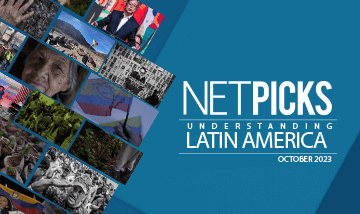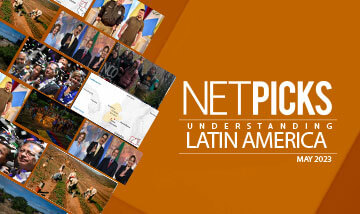Índice
- PERUVIAN DEMOCRACY IN CRISIS
- NICARAGUA: ORTEGA CRACKDOWN DEEPENS AS 94 OPPONENTS STRIPPED OF CITIZENSHIP
- IACHR DECLARES COLOMBIAN STATE RESPONSIBLE FOR EXTERMINATION OF LEFT PARTY
- ‘A WAR SOCIETY DOESN’T SEE’: THE BRAZILIAN FORCE DRIVING OUT MINING GANGS FROM INDIGENOUS LANDS
- STATES OF EXCEPTION: THE NEW SECURITY MODEL IN CENTRAL AMERICA?
- SIX YEARS AFTER THE 1ST FEMINIST STRIKE. DIFFICULTIES, CONTINUANCES AND CHALLENGES FOR THE FIGHT
Understanding Latin America
Dear readers and colleagues, this month we bring you six articles that reflect the reality of Latin America: one each from Peru, Nicaragua, Colombia, Brazil, an article questioning a new trend in Central American security models, and a series of media clips by the Rosa Luxemburg Foundation about International Women’s Day on March 8.
- Peruvian democracy in crisis
- Nicaragua: Ortega crackdown deepens as 94 opponents stripped of citizenship
- IACHR declares Colombian state responsible for extermination of left party
- ‘A war society doesn’t see’: the Brazilian force driving out mining gangs from Indigenous lands
- States of exception: the new security model in Central America?
- Six years after the 1st feminist strike. Difficulties, continuances and challenges for the figh
.
PERUVIAN DEMOCRACY IN CRISIS
Anti-government protests in Peru are dragging into their third month, and many are starting to wonder whether Peru’s institutions can survive this ongoing pressure on the country’s leadership. But how exactly did we get to this point, and where can Peru go from here? These are some of the questions the author attempts to answer. Peru has been trapped in uncertainty since December 7, when former President Pedro Castillo tried to dissolve congress before it could hold another impeachment vote, which ultimately saw his removed from power. Many have compared Castillo to the former right wing president Alberto Fujimori, who tried to dissolve congress in 1992. But Fujimori had overwhelming support by both the public and the military, while Castillo did not. Protesters, mainly Indigenous Quechua and Aymará protesters in the south, have risen to Castillo’s defense, demanding his freedom, the removal of incumbent president Dina Boluarte, new elections, and a new constitution. So far, 60 people have died in the protests, at least 47 of them were citizen protesters. But while these have been the biggest protests in Peru’s recent history, they showcase a deep-seated social anger that goes well beyond the ousting of a president. The deeper roots to this crisis are the growing tensions between the power-holding capital Lima and the often ignored rural peripheries, Peru’s one-sided constitution, a weakened left, and an unelected president who refuses to leave office. What are Peru’s options for bringing this crisis to an end?
Octavio Garcia Soto, February 20, 2023
.
.
NICARAGUA: ORTEGA CRACKDOWN DEEPENS AS 94 OPPONENTS STRIPPED OF CITIZENSHIP
In February, 222 political prisoners in Nicaragua – who include journalists, writers and some of the country’s leading opposition activists – were released from prison and flown to the United States. Less than a week later, 94 of those former prisoners were stripped of their Nicaraguan citizenship. Nicaragua’s government said these actors are “traitors to the motherland” to explain why they were expelled and stripped of their citizenship. Critics of Daniel Ortega’s Sandinista’s government say this is part of President Ortega’s determination to stay in power, after already serving as the President for 16 years. Some of those who lost their citizenship include: the internationally acclaimed novelist Sergio Ramírez, the poet and writer Gioconda Belli, the investigative journalist Carlos Fernando Chamorro, the auxiliary bishop of Nicaragua’s capital, Managua, Silvio Báez, and Miranda, an award-winning reporter who writes for the Spanish newspaper El País and the Guardian. See what they say about their forced exile in the link bellow.
Tom Phillips, February 16, 2023
.
IACHR DECLARES COLOMBIAN STATE RESPONSIBLE FOR EXTERMINATION OF LEFT PARTY
At the end of January, the Inter-American Court of Human Rights (IACHR) declared the Colombian state responsible for the extermination of members of the left-wing Patriotic Union (UP by its Spanish acronym) party in the 1980’s. The UP was the first political party created by the left-wing guerrilla movement the FARC, as their attempt to enter party politics. But they were targeted and assassinated by right-wing paramilitary groups and state security forces in the mid-80s. This massacre is one reason why many members of the FARC were skeptical about laying down their arms and forming a political party again after the peace deal was signed with the Colombian government in 2016. After 30 years of legal struggle, the IACHR finally declared “the State of Colombia is responsible for the human rights violations committed to the detriment of more than 6,000 victims who were members and militants of the Patriotic Union political party, beginning in 1984 and for over 20 years.” The international court – whose ruling is binding – ordered various reparation measures be taken, including educative action like public campaigns to teach this history to the Colombian public. It also ordered the government do more to search for the whereabouts of disappeared UP victims; to provide medical, psychological and psychiatric treatment to survivors; and that the government publicly recognize the state’s role in this dirty part of Colombia’s history. Read more bellow for details of the UP party and this historic ruling.
Peoples’ Dispatch staff writer, February 1, 2023
.
‘A WAR SOCIETY DOESN’T SEE’: THE BRAZILIAN FORCE DRIVING OUT MINING GANGS FROM INDIGENOUS LANDS
Since the beginning of February, Brazil’s environmental protection agency Ibama has been in full force evicting illegal miners from the Amazon rainforest. In this article, The Guardian accompanies members of Ibama’s elite squad, the Special Inspection Group, as they evict these illegal actors from the Yanomami Indigenous territory on Brazil’s norther border with Venezuela. Tens of thousands of illegal miners devastated the region during Bolsonaro’s presidency, whose policies encouraged illegal miners to expand their activities and hijack Indigenous territory, say environmentalists. When President Lula took office in January, he vowed to fight illegal mining in the Amazon, particularly the Yanomami Indigenous territory, one of the worst affected by mining. The Guardian tells the tale of swooping into Yanomami territory by helicopter with the Special Inspection Group, watching illegal miners scurry away into the forest in their wellington boots as the environmental forces fan out across an apocalyptic landscape of sodden craters and fallen trees, destroying the camps and burning mining machinery. Critics say these efforts against illegal mining will be short lived, and in six months they will be back to resume mining activities. But President Lula is adamant that Ibama has come to Yanomami territory to stay. Will these efforts be enough one of the fastest growing industries in the Amazon rainforest?
Tom Phillips, February 28, 2023
.
STATES OF EXCEPTION: THE NEW SECURITY MODEL IN CENTRAL AMERICA?
The governments in El Salvador and Honduras have both normalized the use of ‘states of exception’ to crack down on crime and violence. But this mechanism, which puts more military on the streets to implement security policies and control territories, also limits constitutional guarantees for citizens, like freedom of movement, the right to association, and due process. In Central America, particularly Honduras, Guatemala and El Salvador, crimes rates are the highest in the region, including homicides and femicides. The perpetrators of violence – which often include state agents themselves – are more often than not complex organized crime groups and gangs which have become more sophisticated over time. For years the state’s response to this spike in violence has been to promote punitive policies of repression, known as “mano dura” (or iron fist) like implementing states of exception for certain regions or neighborhoods. It should also be noted that these policies go beyond Central America, and have been widely applied in other regions across Latin America, including Ecuador for example. In Central America, even though these policies have become normalized, they have not lead to improvements or been sustainable. They have been plagued by internal corruption, insufficient training programs, and the continuation of abuses perpetrated by members of state security forces, says the author. Governments in northern Central America, characterized by fragile institutions and lack of compliance with international human rights standards, have failed to provide effective and sustainable responses. Is there another way to address violent crime in the region?
Héctor Silva Avalos, February 22, 2023
.
SIX YEARS AFTER THE 1ST FEMINIST STRIKE. DIFFICULTIES, CONTINUANCES AND CHALLENGES FOR THE FIGHT
It’s been six years since the first March 8 international feminist strike, making it a good time to think about the continuity of internationalist bonds, historical lessons learned and current challenges. During the first strike in 2017, 57 countries participated. By 2019, over 150 countries took part in the international strike, making it a truly global movement. In this article, the Rosa Luxemburg Foundation accumulated a series of videos and voices from women around the world speaking about their fight over the years, sharing reflections about the process, and difficulties and challenges for the future. One of these challenges includes the fight for equality for domestic workers globally, which is mentioned in a separate video by the Rosa Luxemburg Foundation. Domestic workers are on the frontlines of care, and their invisible work sustains the world – but who cares for those who care? They ask. In another article written in 2022, the author calls for socializing care work and the creation of “caring cities.” This is where the needs of residents would be at the heart of urban policy, and we would have to socialize various forms of care to make that happen. This would include any type of care for the elderly, sick and children, education, food, cooking and cleaning. In a capitalist society, care work is deemed a private matter and generally a woman’s responsibility, while is ignored, or at least undervalued, by society. The pandemic showed us that various forms of social labor are truly essential for society to function. Have we come any further to achieving equality and valuing care work over the past six years?
Rosa Luxemburg Foundation, March 2, 2023
https://rosalux-ba.org/en/2023/03/06/6-years-after-the-1-feminist-strike/





